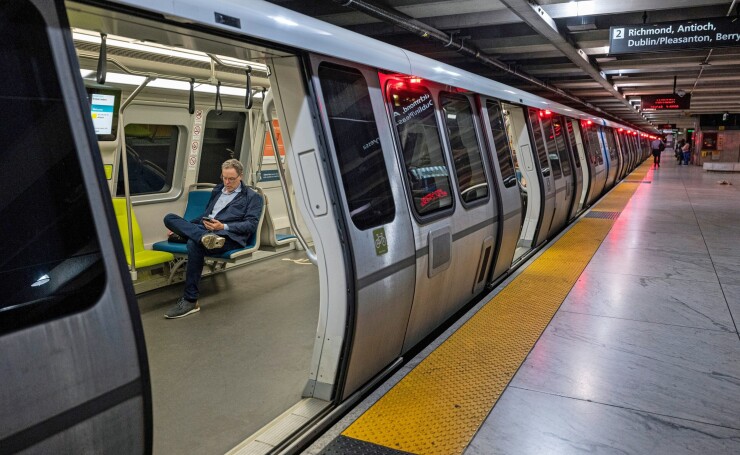Moody's Investors Service affirmed its negative outlook on mass transit, highlighting the San Francisco Bay Area Rapid Transit District as an example, even after the rapid transit system announced it had received state funding.
BART announced on Wednesday that
A day later, Moody's affirmed its negative outlook on the sector, saying the nation's transit systems are confronting a largely stagnant ridership recovery and exhaustion of federal pandemic aid; and the systems "will need to secure long-term funding sources or cut services and make other operational adjustments — or some combination thereof — to stabilize finances."
While California has stepped in with a large funding package, the support is temporary, Moody's said. Systems need to close the gap as federal pandemic aid dries up, through more state or local funding, or with other revenue-raising measures or service cuts, the rating agency said.
"Changes in service made by BART, rated AAA negative, illustrate some of the decisions facing transit systems when considering service levels," Moody's said.

BART received a
Though Fitch rates BART's GO bonds AAA, it assigns BART AA issuer default and sales tax revenue ratings, with negative outlooks on both.
Moody's also cautioned that "while service cuts can provide savings, they risk exacerbating the ridership decline and, in turn, can make it more challenging to secure needed government funding."
"We project ridership to reach just 80% to 85% of pre-pandemic levels by 2026 in light of the shift to remote and hybrid office work," Moody's said.
MTC Commissioners approved a distribution framework for an anticipated $447M in state budget funds from Senate Bill 125 and approximately $300 million of regionally controlled funds to transit agencies while requiring the agencies enhance the customer experience and improve internal efficiency, BART officials announced Thursday.
"This funding from the MTC supports BART's new Safe and Clean Plan to welcome riders back to our system and it buys us time to explore a sustainable funding model while avoiding devastating service cuts," BART General Manager Bob Powers said in a statement. "We want to thank the commission for their approval of these funds and their leadership throughout this process."
BART officials acknowledged in the release that while state funds "are vital to continue near-term operations, they fall short of the Bay Area's funding needs beyond FY26."
The MTC and the Bay Area transit agencies are studying options for additional revenues, including a regional transportation measure. MTC plans to revisit the estimated needs for all operators each year to program the following year's funding.
"This is very good news for the nearly half a million people who ride Muni, every single day," said Jeffrey Tumlin, director of transportation for San Francisco Municipal Railway, a public transit system for the city and county including buses, light rail and cable cars, commonly known as Muni.
"It gives Bay Area transit agencies more time to recover from the impact of the pandemic, which changed commute patterns and is still taking an economic toll on downtown San Francisco," Tumlin said. The funds "will keep Muni financially stable for longer than we had expected provided that we don't expand Muni service beyond current levels."
Prospects have improved for New York's Metropolitan Transportation Authority, Moody's analysts said. The MTA committed to find savings through operating efficiencies to receive certain state subsidies, though those savings are small compared to the recurring state funding it will receive.
If would take new long-term government funding, improved tax collections or service alignments to allow transit systems to achieve financial balance despite lower ridership or a return of ridership to pre-pandemic levels — though analysts said that seems unlikely — in order for Moody's to change the outlook to stable, it said.





